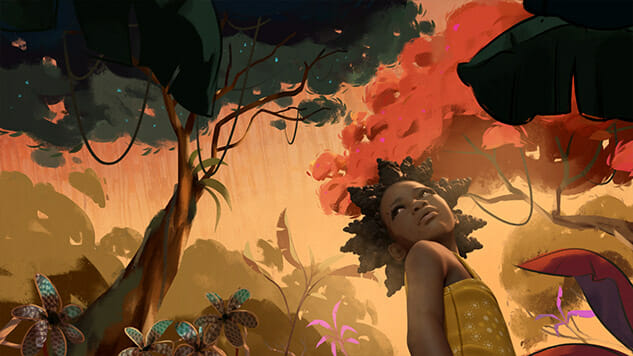
The name Liyana exists in several unrelated languages. In Swati, the main indigenous language of Swaziland, it means “it is raining.”
It never hurts to be reminded of how powerful storytelling actually is. Not in an airy, abstract way, but: empirically, emphatically and literally. (Perhaps you have noticed this playing out in, say, politics.) Which stories we tell and how we tell them-these are profoundly powerful choices that can do anything from spark a war to help that war’s survivors regain the ability to trust the world they live in. Story can influence health outcomes and lifespan, resiliency and self-empowerment, social and political change and, sure, stuff that’s more abstract and mystical than any of that. For a moving example of this, check out Liyana, a part-documentary, part-animated children’s story executive produced by Thandie Newton and set in Swaziland.
There are prodigious numbers of orphaned children in Swaziland, largely because it has the highest HIV infection rate on Earth. In a children’s home in a rural part of the small nation, a children’s book author, Gcina Mhlophe, comes in to help a group of orphaned kids write a story of their own, one that’s collaborative and involves a hero’s journey. The film documents the process and also tells that story, with animation cells, in the voices of the young authors.
Watching them go through the process is sobering-they’re eager participants, though there’s a normal amount of talking over each other, getting distracted or bored, or bickering about artistic decisions. In a hybrid combination of Swati and English they design their young heroine Liyana (though most of the group are boys, everyone agrees the protagonist is a girl) and unflinchingly lay out the backstory that prompts her journey from her home. Abusive, alcoholic, womanizing dad contracts HIV and gives it to Mom; they both die, leaving Liyana with her twin baby brothers and a frail elderly grandma. Then by almost 100% consensus the kids agree that the twins should be abducted by child traffickers. It’s so obvious to them it’s completely chilling even before a title card notes the orphanage had seen a violent robbery three months prior to filming.
Armed only with a friendly bull, a shawl and her grandmother’s necklace, Liyana faces hunger and predators (crocodiles, hyenas, humans), ultimately using sheer wit and courage to turn the trafficker’s guard-monster on them and save not only her brothers but a host of other abducted children who then come back to Liyana’s home to live with Grandma and work together in a garden. Sometimes the children’s suggestions are striking for their sanguine acceptance of violence and deprivation; other times, for their oddly poetic whimsy, as when Liyana uses a glow-worm as a flashlight, sees a forest full of glowing eyes and saves herself by hiding under her shawl. (“She believes,” one child explains, “that if she cannot see them, they can’t see her either.”) One kid specializes in anthropomorphizing the cow, whose many “moo” noises expresses a truly amazing range of thoughts and feelings. Another is a natural at koan-like comments (“Does a hungry cow eat a mango?”) and interestingly wants Liyana to encounter a chameleon in the forest (“But the chameleon is its real color. It is… silver! With glitters”).
It’s not spelled out for them on screen but it doesn’t have to be. “I write my own story,” one child says against a montage of pediatric visits and gardening and building ad hoc tools from scrap materials. “It will not be easy,” says another, “but I get to decide how my story ends.”
The titular character of Liyana has no special powers or supernatural enhancements. She is a skinny human girl without much of anything but the kind of reluctant bravery we develop when we understand the consequences of not doing anything will be harder to live with than the consequences of doing something. She could be any of these kids and indeed she is all of them. It’s a simple enough act, writing a fiction. Actually there’s nothing simple about writing stories; it’s really hard. That’s why it is necessary, and heroic, and powerfully healing. And for people in desperate situations, it’s crucial to understand that while you can’t necessarily change your external circumstances, there’s always the available choice to rewrite your story from “I am a victim of circumstances” to “I overcame my circumstances and I am still here” so that you are the hero, the rainmaker.
Directors: Aaron Kopp, Amanda Kopp
Release Date: October 9, 2018